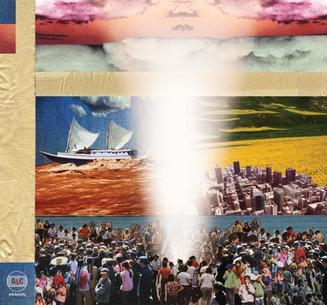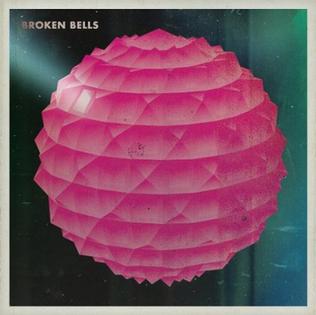 What do you think is going to happen when you have a mopey, melancholy lot of Canadian indie-popsters like Stars, and direct them toward a concept album linking romance, loss, and loneliness with death and the afterlife? Hm? Eh? It's called he Five Ghosts and it is about ghosts. Ghosts for your retro-80's dance pop.
What do you think is going to happen when you have a mopey, melancholy lot of Canadian indie-popsters like Stars, and direct them toward a concept album linking romance, loss, and loneliness with death and the afterlife? Hm? Eh? It's called he Five Ghosts and it is about ghosts. Ghosts for your retro-80's dance pop.It's a lonely, haunted, quiet, cold album, made all the more lonesome because there's actually a lot going on amidst the mourning. Ever walked down a busy city street on a cold dreary fall day? Everyone just drifts onward with no regard for others in the world, but there are so many of you. This music is like that. Synths and beats sparkly as quiet, lamenting vocals waft over them. "Thousands of ghosts in the daylight," sings co-lead vocalist Torquil Campbell on "I Died So I Could Haunt You," "One day we all disappear / We walk till we get to the harbor / They'll never know we were there." The contrast between the lively instrumentation and the dead vocalization is pretty substantial.
It's hard to get ahold of, what the music is supposed to be like. The band tries, sometimes too hard and sometimes unsuccessfully, to reach a kind of profound moment that underlies their music. Here and there it strengthens it, and elsewhere it makes it sound a bit silly. I don't like the opening track, "Dead Hearts," much for its verses, a silly little call and response thing played utterly straight. Though the chorus contains one of the better lyrics on the album, "It's hard to know they're out there / It's hard to know that you still care," which is the first indication of the depth of the ghost metaphor, about the intangible nature of love and human feeling. But they push the seriousness and strain it a fair bit on the album. I'm troubled by "We Don't Want Your Body," whose verses are too deliberate to be funky and loose, and whose chorus uses the line "You sold your soul to ecstasy / So you could have some sex with me," which just such a silly goddamn thing to say. "Some sex." It's otherwise a good song, but that stiffness does them in whenever the album starts to catch fire, and takes me out of the experience.
Amy Millan carries most of her parts beautifully. Her voice has a modest yet sultry quality to it, that could go from being utterly bemused by the world to being supremely seductive. It runs that spectrum in her first solo go, "Wasted Daylight," and while "Fixed" isn't much of a vocal showcase, it's a great piece of songcraft that bounces along so energetically it seems to have been important from another album and band. That "You / You hold my heart" hook is a winner, though, and "How Much More" toward the end of the album lifts the spirit up higher than I would've expected. And "Changes" gives us a modern Peggy Lee or Patsy Cline, both in tune and attitude. Off-kilter though it may be, I can see "The Passenger" having a life outside this album: it's where their cinematic (character and storytelling) tendencies mesh best with the music itself.
But yeah, the album takes chances that often don't pan out or are just hard to listen to. "The Last Song Ever Written" and "He Dreams He's Awake" gradually build toward their point, but there's something so fundamentally-unbalanced about their construction that leaves a bad taste with me. The former is more clever than I initially gave it credit for, and the latter has its place in setting the mood and building the aura of the album. But generally speaking Torquil's voice is my least favourite aspect of Stars' sound, as it represents that strain for meaning.
This isn't a lovable album. It won't wrap its arms around you, it doesn't aim to please, that much is clear. It's serious, sad-ass music, and you have to be in a particular mood to even appreciate it, which is not an ideal condition for good music. I know Stars mainly by two previous singles, "Your Ex-Lover Is Dead," and "Reunion." Those two songs are not exactly "I'm a Believer," when it comes to pop sunshine. They're dreary, storytelling break-up songs. And here's an album that breaks up with life, with the world around you. At its warmest, it's ice cold, and at its most joyful it's still numb.
They definitely wrote and recorded the album the album they meant to, although they didn't probably hit all the points they aimed for. The real question is whether that works for you. Because it's not going to be easy to get into, and if you do, it may not even be that rewarding. I think it's underrated because of that, and because of its tendency (due to its construction and goals) to strain for meaning and reach into pretension. But on every listen, I found more and more to recommend it until I found more tracks I liked than did not.
Whether it succeeds or not, it's music that tries for something, and in fact winds up with something, something I haven't heard before. Feelings stir up in this album that you may not be willing to face. But you might be surprised by what you find when you listen to this one.
Buy this album from iTunes now!







